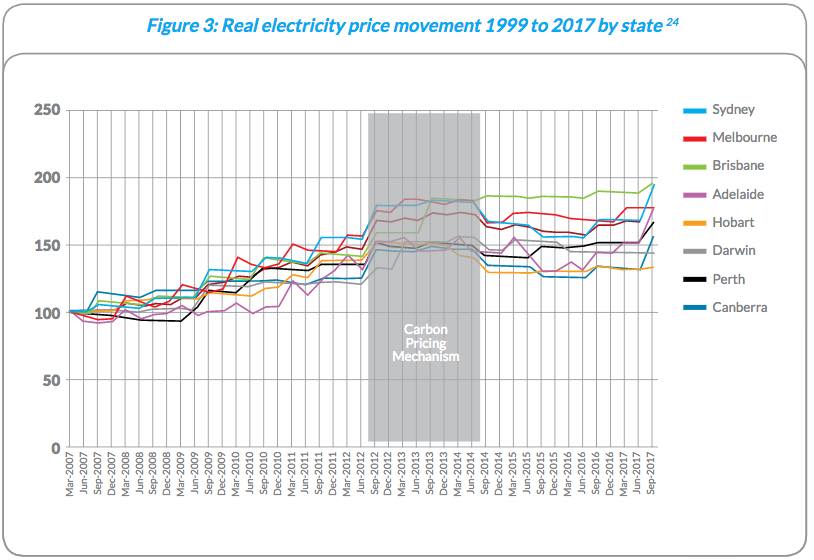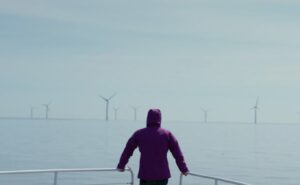A new report has ranked the Abbott Coalition government’s winding back of the renewable energy target, and repeal of the national carbon price, as among the biggest drivers of Australia’s relentless rise in wholesale electricity prices.
The report, Empowering disadvantaged households to access affordable, clean energy, calls on the federal government to end the political deadlock on Australia’s low-carbon energy transition, as a crucial first step in providing urgent relief for thousands of families suffering “energy stress”, as power bills soar.
“There has been a fundamental failure to provide adequate measures to reduce energy stress, and deliver a national coordinated stable energy and climate policy which is a major factor in pushing up energy prices,” said Cassandra Goldie, the CEO of the Australian Council of Social Service (ACOSS), who produced the report alongside Brotherhood of St Laurence and The Climate Institute.
“Low-income and disadvantaged households are bearing the brunt of mismanagement and will be further disadvantaged if the desirable transition to a modern, clean electricity sector is not well managed, inclusive and equitable.”
The report comes at a time when the Conservative Right, including former Prime Minister Tony Abbott, are resurrecting their campaign against renewable energy as “the most expensive and least reliable” source of electricity, and their narrative that cheap power can only come from coal-fired power plants (a myth that was neatly skewered by EnergyAustralia CEO Catherine Tanna, just last week).
“The Liberal Party has to be the party of cheap power, let Labor be the party of expensive power,” Abbott told Sydney’s 2GB radio in June. “I’ve spent a lot of time talking about electricity and the last thing we want to do is let electricity off the hook”.
Certainly, the mainstream media is not letting renewables off the hook in the power price debate. Monday’s editorial in the Brisbane Courier-Mail declared that “Labor’s zealotry on renewable energy targets is sending the country broke,” next to the statistic that more than 464 Queenslanders a week are having their electricity disconnected.
But as the ACOSS report notes, the major political parties’ endless “talking about electricity”, culminating in the commissioning of the Finkel Review and the latest meeting of the state and federal energy ministers, has been a major part of the problem.
“The lack of policy certainty is now one of the biggest drivers of wholesale electricity price rises,” the report says.
“A decade of policy instability; regulatory inaction; failure to better align climate, energy and social policy; and blame-shifting among federal and state governments is central to the deterioration of every element of the energy trilemma.
Like many major studies before it – this one was done in consultation with more than 120 community, environment and energy experts across Australia – the ACOSS report names the biggest drivers of higher power bills as increases in wholesale, retail and network costs, and calls for reform in all three areas. And like other major reports investigating Australia’s high power prices, rolling back policy support for renewables like solar and wind – now recognised as the cheapest forms of new energy generation – is not recommended.
“There are many factors behind the rise in electricity prices, including high gas fuel costs, sudden tightening of the supply-demand balance caused by generators exiting at short notice, decreasing competition and the exercise of market power, excessive expenditure on network capacity, and, in South Australia, a greater need for ancillary services coupled with an underdeveloped framework for their provision,” the report says.
“However, an overarching driver of higher prices is the lack of a reliable policy and regulatory framework that supports efficient investment in clean energy and supporting technologies. This, in turn, is related to weaknesses in the system of governance of the electricity sector.”
The report goes on to say that without policy adjustments across each element of the electricity supply chain – wholesale, network and retail – “unnecessary and unfair costs are likely to increase,” in turn increasing the number of people struggling under some degree of energy stress.
“Reducing the uncertainty requires the integration of climate and energy in ways that solve each aspect of the energy trilemma – affordability, emissions reduction, and security and reliability – and in ways that are consistent with the long-term climate objectives to which Australia has committed through the Paris Agreement.”
“Unless there is a nationally coordinated plan that is fair and inclusive – and far better integration between climate, energy and social policy – vulnerable households will be left behind,” said the Brotherhood of St Laurance’s head of energy and climate change, Damian Sullivan.
“Australia can do better. Energy is an essential service, so we must make clean energy available and affordable for all.”












